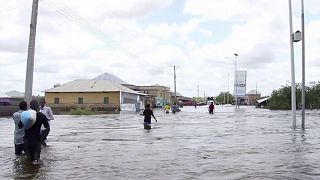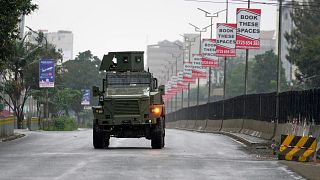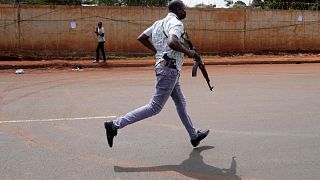Kenya
Residents of a Nairobi slum are on a mission to reducing the damage from flooding in their area.
Volunteers work together to clear debris and waste that is blocking the waterways and drainage at an informal settlement.
Armed with shovels, brushes and rakes, the volunteers are working with Weather Mtaani - a group set up to help improve life for the people living here.
A lack of proper working drainage systems means flooding is likely when it rains, due to it being clogged with rubbish such as plastics, clothing and sludge.
The Kenya Meteorological Department (KMD) has been training young people from informal settlements to interpret weather forecasts.
Race against the clock
Volunteer at Weather Mtaani, Ann Atieno, explains it is a race against the clock to clear as much rubbish as possible ahead of the rain.
She's received a weather forecast message from Weather Mtaani, which translates as village weather, predicting rain in the coming weeks.
It's prompted her to band together with volunteers to clean up around Kiberia - one of the largest slums in Africa with an estimated population of 250,000.
"Weather Mtaani has sent us a message warning us that it might rain and that we should be ready. We are not sure if it will rain or not but we must be ready and inform our neighbours to take rightful measures. We warn children not to play near rivers, we look out for faulty underground electrical wires and unclog water drains, so that if the rains come, we will not be caught off-guard. That is how we stay ready. Also in homes, we put our belongings above the ground," she says.
Every week the volunteers receive weather forecasts, seasonal outlooks and warnings from KMD, which they translate into the local language.
The translation is sent to other volunteers through WhatsApp or SMS, which is then sent widely to residents.
"Weather Mtaani helps us by sending weather forecast messages, which we send to other residents. And if there are any clean ups, they help us do it, because here we have poor drainage systems. We do the clean-up a few days before the rains start, so if it rains, the drainage systems are clean. Weather Mtaani also gives us tools to clean up," says Mary Akoko, volunteer, Weather Mtaani.
Translating the message in different languages
Community leaders are trained to interpret the weather forecasts which they translate into Swahili as well as the local dialects.
James Kirika, a community leader at Weather Mtaani, says:
"After getting the messages from the Kenya Meteorological Department (KMD), we translate it into a simple message that people can easily understand. We do it with SMS or WhatsApp. After we send it, it usually has advice. So the advice is what people use in times of extreme heat and also flooding. We also do clean ups before the long rains," he says.
Weather Mtaani started as a pilot project in 2019 under Developing Risk Awareness through Joint Action (DARAJA), run by the Weather and Climate Innovation Services for Africa program under the United Kingdom’s Met Office and the Department of International Development.
Pascaline Chemaiyo, a principal meteorologist at KMD, says there has been an increase in the uptake of weather forecasts by slum residents since the project began.
"Weather information is very key to our users and more so to users in informal settlements. This is because the kind of forecast we used to share before, the dissemination method was through emails and some of them were not able to access the information, or even the few that accessed it were not able to interpret it."
"Then we made a tailored-made focus for them, and we were able to train them on how to interpret. With this, we have seen that this information is very key to them because they need it for their day-to-day activities and planning of their day-to-day life. And this has helped most of them to save lives and even property."
The project was so successful that after the pilot project ended, the KMD continued to send weather forecasts to Weather Mtaani leaders.
"Most of them are being affected by flash floods from Ngong River, because when we get heavy rains in Ngong area, most of the water runs through Ngong River that runs through the informal settlements. Most of them were being carried away, losing their lives due to the floods and even their properties. At the same time, when we have high temperatures, most of them are affected by the heat because the structures we have in those informal settlements cannot withstand high temperatures and, again, we have heard cases of fire outbreaks during the dry season," says Chemaiyo.
Previous flash flooding has been deadly and caused destruction to homes in Kenya slums.











01:01
Kenya: Visa-free travel now available for many African and Caribbean countries
00:22
Boniface Kariuki, a Kenyan mask vendor shot at close range laid to rest
11:17
Bridging the legal gap in Africa’s digital boom {Business Africa}
Go to video
First Malaria treatment for babies approved
02:16
Kenya's William Ruto faces growing discontent over economy and police brutality
00:28
Nairobi hawker shot at close range by police declared brain dead